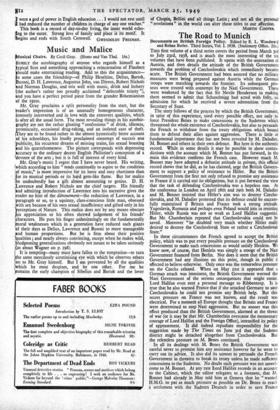Music and Malice
lIvItialcal Chairs. By Cecil Gray. (Home and Van Thal. 16s.) SURELY the autobiography of anyone who regards himself as a 1 ypical Scot and something approaching a reincarnation of Flaubert hould make entertaining reading. Add to this the acquaintance— n some cases the friendship—of Philip Heseltine, Delius, Bartok, pusoni, D. H. Lawrence, Augustus John, van Dieren, Robert Nichols and Norman Douglas, and mix well with music, drink and lechery (the author's rather too proudly acclaimed " delectable trinity "), and you have a perfect period piece from the grander Bohemianism of the 192os.
Mr. Gray proclaims a split personality from the start, but the reader's impression is of an unusually homogeneous character, intensely introverted and in love with the extrovert qualities, which is after all the usual form. The most revealing things in his autobio- graphy are not the rather gloating " confessions " of drink, idleness, promiscuity, occasional drug-taking, and an isolated case of theft. 'hey are to be found rather in the almost hysterically bitter account of his schooldays, his loudly proclaimed contempt of success arm publicity, his recurrent dreams of missing trains, his sexual boasting land his quarrelsomeness. The picture corresponds with depressing accuracy to the ordinary decent English Philistine's conception of a (devotee of the arts ; but it is full of interest of every kind.
Mr. Gray's music I regret that I have never heard. His writing, (which according to him " tends continually to aspire to the condition . f music," is more impressive for its loose and easy chattiness than or its musical periods or its hard gem-like flame. But for malice I he undoubtedly has a gift almost amounting to genius. D. H. it.awrence and Robert Nichols are the chief targets. His friendly and admiring introduction of Lawrence into his narrative gives the reader no hint of the denouement—the reduction of Lawrence, in a 'paragraph or so, to a squirmy, class-conscious little man, obsessed 'With sex because of his own sexual insufficiency and gifted only in his erceptions of Nature. This malice does not by any means obscure is appreciation or his often shrewd judgement of his friends' characters. He puts his finger unhesitatingly on the fundamentally moral weaknesses which in a generation have reduced such giants I
of their days as Delius, Lawrence and Busoni to more manageable 'and human proportions. But he is firm about their positive qualities ; and nearly always convincing, except when he makes wild, bludgeoning generalisations obviously not meant to be taken seriously as about Wagner on p. 298).
It is tempting—many must have fallen to the temptation—to turn the same mercilessly scrutinising eye with which he observes others on to Mr. Gray himself. But I am prevented by all the qualities which he most despises, and by one other. For me he remains the early champion of Sibelius and Bartok and the lover of Chopin, Bellini and all things Latin ; and not all the personal " revelations " in the world can alter those titles to our affection.
MARTIN COOPER.














































 Previous page
Previous page